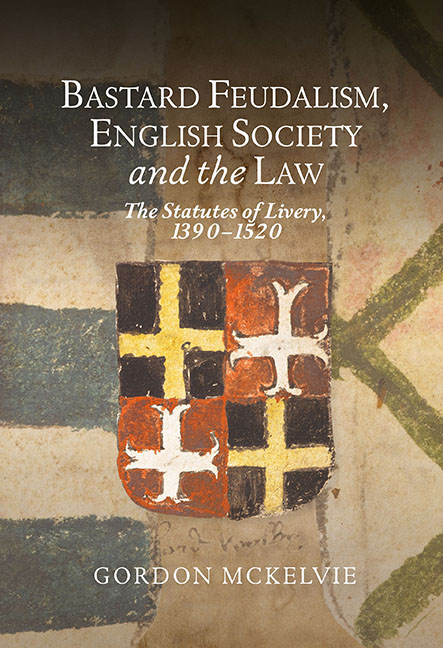Book contents
- Frontmatter
- Contents
- Acknowledgements
- Abbreviations
- Timeline of Parliamentary Activity
- Introduction
- Chapter 1 The System – Liveries and Retaining
- Chapter 2 The Early Years, 1390 to 1449
- Chapter 3 The Later Years, 1449 to 1520
- Chapter 4 Outcomes and Enforcement
- Chapter 5 The Identity of the Indicted
- Chapter 6 The Geography of the Cases
- Chapter 7 Networks and Localities
- Chapter 8 Livery and Disorder
- Chapter 9 The Urban Experience
- Conclusion
- Appendix 1 Number of Cases by Reign
- Appendix 2 Number of Cases in each County
- Appendix 3 List of Letters to Towns and Lordships
- Appendix 4 List of Local Ordinances
- Appendix 5 Letters from Henry VII to Duchy of Lancaster Officials
- Bibliography
- Index
Chapter 4 - Outcomes and Enforcement
Published online by Cambridge University Press: 02 April 2020
- Frontmatter
- Contents
- Acknowledgements
- Abbreviations
- Timeline of Parliamentary Activity
- Introduction
- Chapter 1 The System – Liveries and Retaining
- Chapter 2 The Early Years, 1390 to 1449
- Chapter 3 The Later Years, 1449 to 1520
- Chapter 4 Outcomes and Enforcement
- Chapter 5 The Identity of the Indicted
- Chapter 6 The Geography of the Cases
- Chapter 7 Networks and Localities
- Chapter 8 Livery and Disorder
- Chapter 9 The Urban Experience
- Conclusion
- Appendix 1 Number of Cases by Reign
- Appendix 2 Number of Cases in each County
- Appendix 3 List of Letters to Towns and Lordships
- Appendix 4 List of Local Ordinances
- Appendix 5 Letters from Henry VII to Duchy of Lancaster Officials
- Bibliography
- Index
Summary
In a discussion between the justices at Blackfriars soon after Henry VII's first parliament in 1485, chief justice William Hussey stated that ‘the law would never be carried out properly until the lords spiritual and temporal are of one mind for the love and fear they have of God, or the king, or both, to carry them out effectively’. Hussey then recalled that when he was an attorney during Edward IV's reign, various lords had sworn in Star Chamber not to illegally retain but that less than an hour later he witnessed lords retaining men ‘by oath, and swearing, and doing other things contrary to the above mentioned promises and oaths’. If accurate, the report suggests that many of the problems related to the enforcement of the law already examined were recognised by contemporaries. The law was enforced sporadically but a fuller understanding of the effectiveness of the statutes needs to account for how cases were, or were not, resolved. This chapter therefore explore the outcomes and the legal processes of the cases to develop a fuller understanding of the enforcement of the statutes.
Who Heard the Cases?
Ninety-nine cases are known from oyer et terminer files, while the rest in the King's Bench were presumably initiated by local JPs. In theory, oyer et terminer commissions had the advantage that they imported into a locality powerful nobles and judges who were independent of the county's internal power structures, making them ‘the most powerful instrument the king possessed’. Such commissions either arose from a private request or were initiated by the crown after reports of disorder in a particular county or counties. Yet some commissions of oyer et terminer could be biased in favour of a certain faction within the county. John Watts has stated that ‘oyer et terminer commissions to local notables were entirely ineffective as a means of asserting central authority’ because ‘most of the commissioners with muscle were already belligerents; those without were soon drawn in’. Not all commissions of oyer et terminer, however, were one-sided affairs. The Staffordshire cases of 1414 arose from a commission resulting from parliamentary petitions from both Hugh Erdeswyk and Edmund Ferrers about the lawless activities of the other. The subsequent indictments against Ferrers, Erdeswyk, their retainers and others in the county were a result of their own complaints.
- Type
- Chapter
- Information
- Bastard Feudalism, English Society and the LawThe Statutes of Livery, 1390–1520, pp. 81 - 105Publisher: Boydell & BrewerPrint publication year: 2020

